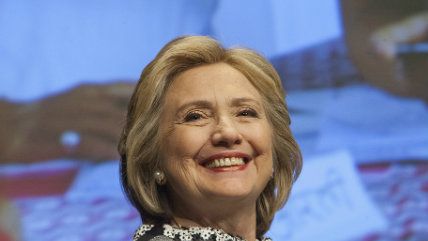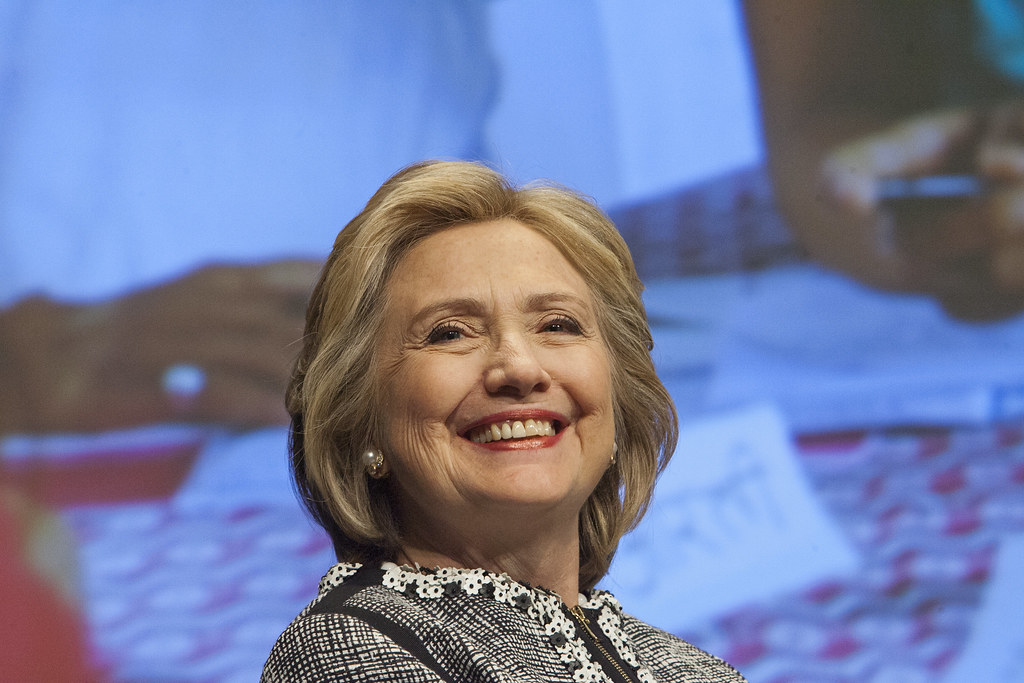Hillary Clinton Makes History. Does Anyone Care?
This is a "historic, unprecedented moment," said Clinton. The response has mostly been a collective 'meh.'


Hillary Clinton is all but assured to become the first female candidate to capture a major party's presidential nomination. On June 6, the Associated Press declared her the presumptive Democratic nominee, after a poll of Democratic superdelegates (including those who hadn't yet announced their allegiance) found Clinton with enough support to secure the nod. At AP's count, Clinton's delegates won in primaries and caucuses plus her declared supporters among superdelegates pushed her over the threshold of 2,383 delegates, just ahead of the Tuesday primaries.
"Clinton was ebullient but also restrained as she received the news at an uncanny moment—almost eight years to the day after she ended her campaign against Barack Obama before a crowd of many teary women and girls," The New York Times reported.
"I got to tell you, according to the news, we are on the brink of a historic, historic, unprecedented moment," said Clinton Monday, "but we still have work to do, don't we? We have six elections tomorrow, and we're going to fight hard for every single vote, especially right here in California."
Sen. Bernie Sanders has been insisting that some superdelegates, who can change their minds at any time before the convention, will shift their loyalties. As Scott Shackford wrote here earlier today, "Sanders is technically accurate while, you know, probably going to be wrong." Still, Sanders campaign spokesman Michael Briggs issued a statement discounting the AP poll and calling it "unfortunate that the media, in a rush to judgment, are ignoring the Democratic National Committee's clear statement that it is wrong to count the votes of superdelegates before they actually vote at the convention this summer." (Fortunately, the media doesn't take its orders from the DNC.)
Next up: "we're in for a sustained period of mudslinging" between Clinton and Donald Trump, as Daily Beast blogger Eleanor Clift writes. Clift's piece strikes a triumphant note about Clinton, stating that "for women born in the middle of the last century"—like Clift—"this is the kind of unimagined achievement that makes you wonder if you stepped into the middle of a new Broadway play, perhaps 'Hamilton' spun in another way to make the Founding Fathers turn over in their graves." Barack Obama "shattered the tradition" of a white male president, Clift writes, and "now Clinton is poised to continue the change that Obama's presidency began."
Full-fledged celebration of this historic moment, however, seems mostly limited to those already firmly with team Clinton. On political-minded Twitter, Clinton's coronation is overshadowed by arguments over whether establishment Republicans have condemned certain Donald Trump statements harshly enough. Perhaps it's just that her victory in the Democratic primaries has seemed assured for so long already—"Hillary Clinton Just Got News That Makes Official What We Already Knew Was Going to Happen," read the headline at Rare. The BBC's Katty Kay suggested that "the lack of exuberance may come from the fact that this has all been going on for so long. We've really been reworking a version of the 'first viable female candidate for the presidency' story since 20 January 2007, the first time Hillary Clinton declared her candidacy for the White House. We're exhausted. We've run out of superlatives."
Time also tried to make a case for why nobody seemed to care much: "Clinton, a former Secretary of State, Senator and First Lady, has already been a trailblazer over four decades in public life," plus "women are no longer newcomers to presidential politics. Before the rise of Obama in 2007, Clinton was a likely Democratic nominee. Younger voters remember Sarah Palin's turn as a vice-presidential nominee in 2008, and their parents recall Geraldine Ferraro's turn in 1984; a woman leader just seems obvious to them. Others, such as Carol Moseley Braun in 2004, Michele Bachmann in 2012 and Carly Fiorina in 2016, have made unsuccessful attempts before, and the novelty simply is not there for Clinton."
An alternative or complementary answer, of course, is that Clinton's barrier-breaking status simply isn't enough to overcome her unpopularity. Both Clinton and Trump have unfavorable ratings above 50 percent. Clinton may have a lot of love among supporters, but among those who dislike her she tends to inspire strong dislike. People aren't tepid about Hillary Clinton. And whether the vitriol is tied up in her policies, her persona, her sex, or all of the above, it's not the sort of thing people—especially young voters—are likely or willing to put aside, even temporarily, for the sake of celebrating symbolism.


Show Comments (94)